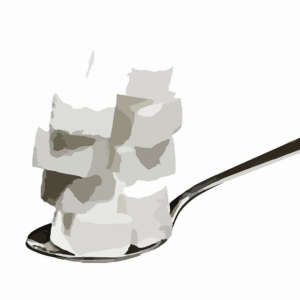
The large consumption of refined sugar is a problem for our fast-paced society. You may not realize how much sugar you are consuming.
Items such as crackers, salad dressings, spaghetti sauce, ketchup, reduced-fat foods, cereals, bread products, etc., can all be loaded with hidden sugar, with names including fructose, corn sweeteners,sorbitol, malt, saccharin and rice syrup.
Some food companies will use a few different types of sugar in one product so that the sweeteners don’t have to be listed too high on the ingredients list!
If you do buy some processed foods, check for sugar/sweetener in the first six ingredients of your purchase.
Besides ruining our teeth, sugar intake can largely compromise our health in general.
Sugar can affect our health by:
1. Increasing cholesterol levels, which is considered to be a risk factor for heart disease. Connie Bennett and Stephen Sinatra, authors of Sugar Shock!, suggest “Cutting out sweets and refined carbohydrates—or at least eating a lot less of them— is perhaps the best way to protect your heart.”
2. Prompting our bodies to turn excess sugar into fat. Fat cells not only contribute to obesity, but they also produce toxic chemicals.
3. Interfering with the assimilation of vitamin C in the body. Vitamin C not only helps fight cold and flus(one teaspoon of sugar can decrease our immune capacity for hours), but it encompasses many aspects of health, from maintaining healthy blood vessels and aiding cholesterol metabolism, to relief of inflammatory back pain.
4. Increasing oxidative damage, leading to premature aging and wrinkles.
5. Feeding Candida (yeast), fungi and cancer cells.
6. Aggravating existing food allergies/intolerances.
7. Contributing to mental disorders such as ADD and ADHD, bipolar, schizophrenia and Alzheimer’s. It can also worsen anxiety, hyperactivity, mood swings, depression and PMS.
8. Depleting our body’s store of vitamins and minerals
9. Affecting our brain and central nervous system. According to David Kessler, M.D. and author of The End of Overeating, the opiods neurons in our brain, which are produced by the consumption of high-sugar, high-fat foods, have shown “rewarding effects similar to drugs such as morphine and heroine”. These effects include short term pain relief and calmness.
I have struggled with a sugar addiction in my life and can say it was hard to break and detrimental to my personal growth. In times I consumed a lot of sugar I was depressed, moody, low-energy and would easily catch a cold.
After cutting out most of my sugar a few years ago (yes, I still indulge once in a while), I have felt healthier, stronger and more vibrant.
So, what can we do to ensure that we “pass” on the sugar more often than not?
Here are some tips:
• Substitute applesauce or fresh fruit juice in your baking
• Snack on nuts and raisins or fresh fruit instead of sugary foods
• Always have healthy snacks easily available in your home and at work
• Make sure you are getting some healthy carbohydrates (whole grains, root vegetables, squash, etc.) in your diet, as a lack of them can cause sugar cravings
• Take a good quality multivitamin/mineral daily because a lack of B vitamins or chromium (essential mineral) can cause sugar cravings
• Eat small meals more often and choose healthy, whole foods instead of processed ones
Feelings/experiences from the past can cause sugar cravings as well. For some people, addressing these issues is the only way they are able to break their sugar addiction.
Some examples of this include: childhood memories of getting sugary treats as rewards, childhood memories of only having quality time with family during feasts or dinner (so there is an association with eating and feeling comfortable/loved during eating times and not often during other times), or no longer being able to listen or identify with your internal hunger cues (read more about this in Intuitive Eating by Evelyn Tribole and Elyse Resch).
It is important to educate yourself and others about the health effects of sugar—the books noted in this article are a great starting point.
A few other motivating ideas are to: make an impression on the children in your life by role-modellinghealthy habits; hold healthy recipe parties; add health books to your book club’s repertoire; talk to your friends about health experiences; and share what you learn and experience.
Your body will thank you for passing on the sugar—mine sure did!
Amoree Briggs lives in the Yukon countryside with her family and has just completed her diploma in holistic nutrition.

